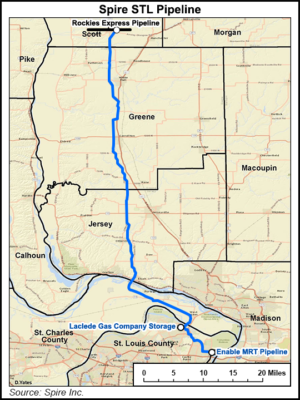A pipeline company who has a line cutting through southern Scott and all of Greene County came under fire from a 3-judge panel of the D.C. Circuit Court of Appeals on Monday. The Federal Regulatory Commission was questioned by the panel on why it didn’t do more to check Spire STL Pipeline’s assurances or insider dealing with its affiliates.
The project that cut through Greene and Scott County during construction in 2018-2019 now moves over 400,000 decatherms of gas from the Rockies Express Pipeline system into the St. Louis area.
According to an S&P Global report, the project faced a challenge by the Enviornmental Defense Fund because FERC did not look beyond a contract for 88% of the pipeline’s capacity in the commission’s review of the need for the project. Enable Mississippi River Transmission LLC, or MRT, and the Missouri Public Service Commission also raised objections during the FERC review that the project was not needed and would hurt competition in the St. Louis natural gas market.
Former FERC Chairman Richard Glick had contended that the company did not explain why capacity of an existing pipeline by MRT was not sufficient to meet the St. Louis area’s needs.
The judges asked FERC why they did not look closer into Spire’s self-dealing with its affiliate. In the court documents, Judge David Tatel asked why FERC allowed the pipeline to be built when it provided no pricing benefit to customers but provided obvious benefit to the company’s shareholders.
FERC attorney Anand Viswanathan told the panel that in a rehearing order the commission had found that Spire had provided adequate explanations to overcome concerns about overbuilding pipeline infrastructure in the area. According to these explanations, the Spire STL line would enhance reliability and supply security, reduce reliance on older pipelines and mature gas production basins, and eliminate dependence on propane peak-shaving infrastructure. Jonathan Franklin, an attorney representing Spire, argued that the existing pipeline systems could not meet demand needed to retire existing propane peaking facilities. Franklin also said that Spire’s reliability concerns related to a major freeze-off or a storm. Franklin said that all of the alternatives to the Spire pipeline that FERC considered would have involved building additional facilities.
The judges remained skeptical of the arguments and have ordered further hearings on the matter.
The pipeline has come under fire from local landowners on the pipeline’s easement, claiming that the company did not restore the land to its previous landscape and have caused flooding, destruction of farm ground, and further problems from run off. FERC ruled against a filing by Central Holdings, LLC representing a group of those landowners based on the complaints back in January.




